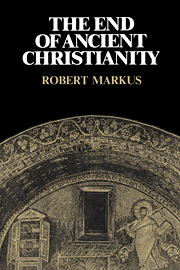Book contents
- Frontmatter
- Contents
- Preface
- Abbreviations
- 1 Introduction: ‘secularity’
- I The crisis of identity
- II Kairoi: Christian times and the past
- III Topoi: space and community
- 10 Holy places and holy people
- 11 City or Desert? Two models of community
- 12 Desert and City: a blurring of frontiers
- 13 The ascetic invasion
- 14 Within sight of the end: retrospect and prospect
- Sources referred to
- Secondary literature referred to
- Index
13 - The ascetic invasion
Published online by Cambridge University Press: 05 June 2012
- Frontmatter
- Contents
- Preface
- Abbreviations
- 1 Introduction: ‘secularity’
- I The crisis of identity
- II Kairoi: Christian times and the past
- III Topoi: space and community
- 10 Holy places and holy people
- 11 City or Desert? Two models of community
- 12 Desert and City: a blurring of frontiers
- 13 The ascetic invasion
- 14 Within sight of the end: retrospect and prospect
- Sources referred to
- Secondary literature referred to
- Index
Summary
Monks were becoming part of the daily experience of a great many town-dwellers in fifth- and sixth-century Gaul. Bishops, especially if they had themselves been monks, often founded monasteries and nunneries, and monks served the suburban sanctuaries of local saints. Monks were present in towns and in their close neighbourhood, and could influence – just by being there? by example? – lay people, such as the young Honoratus and his brother. Monastic practices were becoming familiar in ever widening circles. In the last chapter we observed some of the ways in which the boundaries that divided the Desert from the City were being blurred in the ascetic spirituality of Gallic monasteries as that developed in the fifth century. We now turn to consider how the impact of this spirituality made itself felt in the larger world of the Gallic Church; how the values upheld for the Desert found a foothold in the City.
Above all else, and especially in Gaul, the invasion of the City by the Desert was achieved through the confluence of aristocratic and ascetic traditions in its episcopate. Men of standing in Jay society, with wealth, prestige and secular savoir faire, were in great demand to fill clerical offices and vacant bishoprics. The practice of electing such men became especially common in fifth-century Gaul, during a time when secular administration was weakening in many Western cities, and bishops were taking over the leadership of their communities.
- Type
- Chapter
- Information
- The End of Ancient Christianity , pp. 199 - 212Publisher: Cambridge University PressPrint publication year: 1991



